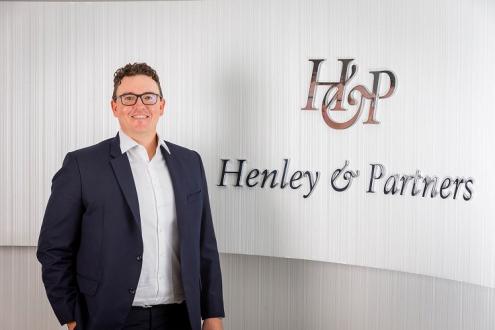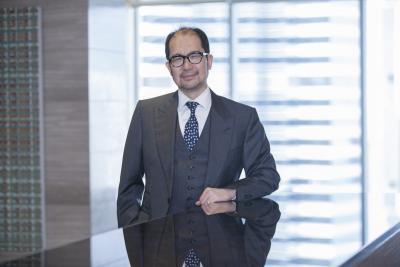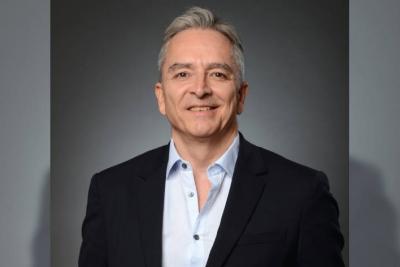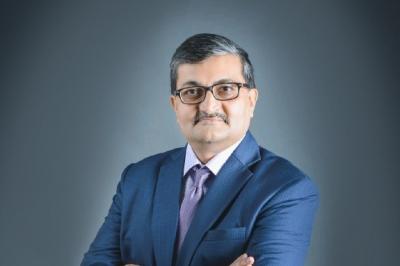Wealth Solutions & Wealth Planning
Dominic Volek Surveys the Global Investment Migration Industry and Henley & Partners’ Fast-Track Expansion
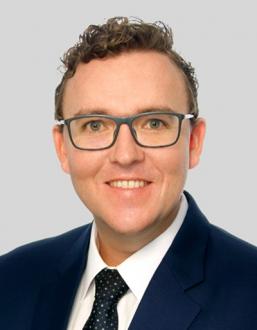
Dominic Volek of Henley & Partners
Mar 17, 2022
The French have a famous adage: ‘Plus ça change, plus c’est la même chose’. Loosely translated, this means the more things change, the more they stay the same. Roughly two years after the Covid-19 pandemic struck, business travel remains difficult, and social and family travel is still hugely restricted — yet these ongoing inconveniences have been completely overshadowed by the magnitude of the rapidly escalating situation in Ukraine and its consequences both on Europe and the rest of the world. Amid widespread adversity and uncertainty, interest in investment migration continues to surge. To plot the coordinates of exactly where the investment migration industry is right now and where it is heading, we recently met up again with Dominic Volek, who is the Dubai-based global Group Head of Private Clients at the world’s leading investment migration advisory firm Henley & Partners, where he is also a Member of the Group Executive Committee. A stalwart in the Hubbis pages for quite some years, especially when he was in Singapore, Dominic offered a very thorough and insightful overview of the key themes, motivations and trends taking place. The overriding narrative is that global demand has never been stronger for residence and citizenship alternatives around the world, with even more of the world’s wealthy seeing the value of diversifying their options in this regard. And far from demand mostly coming as it did historically from emerging countries with weaker passports, demand from the wealthy in the US and other developed nations has been driving Henley’s growth over the past couple of years, with clients from there often assembling a mini portfolio of residence and citizenship alternatives. Meanwhile, Dominic is still also Managing Partner and Head of APAC and reports that demand in the Southeast Asia region particularly remains especially robust.
Dominic was in Singapore for five years running the Asian operations for Henley & Partners (Henley) until late 2020, when he moved his base to Dubai. Although he loved life in Singapore, he reports that Dubai has proved to be an excellent alternative, for a variety of reasons, including an ideal time zone from which he can fulfil all his current roles, including as a member of the five-strong global executive committee. From Dubai, he has also enjoyed considerably more travel flexibility than he would have had in Asia, and he reports that it has been a great base from which to keep driving the global private client business for the firm.
He remarks that Dubai’s healthcare system and the government’s approach to the virus has been impressive thus far. “Access to robust and resilient healthcare systems that can successfully respond to infectious disease threats and pandemics has become a key priority for our high-net-worth clientele, and in that regard, Dubai, amongst other selected international financial centres, shines bright,” he says. “Managing to keep the borders fairly well open and activity bristling is an added bonus that Dubai has offered the international business community.”
Evolving needs, evolving motivations
He steps back from the immediate to remind us of some of the history of investment migration, and that there are many different reasons why investors and wealthy families are interested in expanding and diversifying their domicile options. In the earlier days, the primary motivation was global mobility and to obtain easier, visa-free travel for citizens of emerging nations. He cites the Philippines as a classic example of a country where there is significant wealth but where citizens need to apply for visas for numerous countries. The same is true of Thailand, Vietnam and a variety of other countries in the APAC region. “You have all these successful, talented individuals and families of entrepreneurs and business owners who were hampered by the limitations of the passport that they were born with,” he explains.
He notes that the investment migration business moved into the mainstream as an acknowledged asset class about two decades ago and is now a multi-billion-dollar global industry, with more and more HNW and UHNW individuals seeing the advantages of acquiring a second residence and/or alternative citizenship and passport through a residence or citizenship by investment program, especially those that allow easy access to the European Schengen zone.
New and dynamic pockets of demand
He reports that in recent years since the pandemic started, other motivations have emerged, and new clients have come through. Emerging market demand remains very robust, but there is also significant interest from the US, Canada, Australia as well as from a number of countries in Europe and even the UK. He reports that, perhaps surprisingly, the US was Henley’s biggest single source of clients in both 2020 and 2021.
“With those developed countries, travel freedom is not the driver for the clients because they already have very good passports, but people there are looking to hedge against market and political volatility, an erosion of their civil liberties and to mitigate their risks,” he reports. “They can afford to, and see it as prudent to hedge their bets, spreading their assets and their wealth across real estate, mainstream public securities, private assets, digital currencies, fine wines or whiskies or art, and so forth. And this is geographical diversification as well of course which can benefit the entire family, opening up new business, education, healthcare and retirement options.”
Building a portfolio of options
Accordingly, Dominic highlights how having a diversified domicile portfolio, with multiple options in terms of where they can live or easily spend time is very valuable to such clients. “We have seen the significant spike in demand for second or third citizenships and residences from markets like the US and the UK,” he reports. “Naturally, the pandemic has further fuelled demand, and the choice of location is nowadays also influenced by how certain countries have managed the pandemic, and how their healthcare facilities have coped.”
And this, he says, accordingly brings in a new element into the discussion. “Imagine a very wealthy American sitting in the US who has everything at their disposal, from private jets to multiple houses, but everything is US-centric,” he elaborates.
“Through investment migration they can get unlimited access to Europe, perhaps potentially permanent residence in Australia, or New Zealand, both of which are seen increasingly attractive billionaire boltholes. More residence permits and more citizenships translate to greater flexibility and less risk for the clients and their families in a volatile and unstable era of uncertainty.”
He also notes that whereas in the past, very few clients would actually move to the country in which they invested, perhaps 5% or less, today that percentage is rising.
Managing forgotten risks
Dominic adds that healthcare risk management has become another factor, especially with the expansion of private hospitals across many emerging nations in the past several decades. “Since the outbreak of the Covid-19 pandemic, mitigating against the lack of adequate healthcare provision has become central to thinking,” he asserts. “A very wealthy individual from an emerging Asian country could, for example, if armed with the right residence or citizenship alternatives, bypass a potentially slow vaccine rollout in their country and fly into a highly developed jurisdiction where they also reside and obtain a more internationally recognised vaccine a lot quicker.”
Working with the wealth management community
As to the manner in which Henley sources its clients, Dominic reports that the firm works closely with the wealth management industry and associated professions. “We are in constant liaison with private bankers, private client lawyers, financial advisors, IAMs, tax advisors, corporates, fiduciary companies, and others who refer clients to us,” he says. “We then work on a fee share arrangement. It fits the bill for them, as clients prefer to look holistically at their wealth and their total planning, not only for themselves but their families. We are benign partners, as we do not cross over into any other areas of portfolio management, we focus entirely and exclusively on investment migration. Moreover, we can often reciprocate referrals to our business partners now that we have such a major client base and extensive geographical coverage.”
On this point, he reports the firm has grown rapidly in the past five years, and particularly since the start of the pandemic. “We have expanded our global footprint pretty aggressively,” he says. “We have 35 offices today, and will open another 12 or possibly even more offices this year, including new offices in the Middle East, Africa and South America. That is fast-track expansion.”
Two ‘partnership’ models
As to how Henley works with their intermediary partners, he says there are two primary models. One option is a fee sharing model for successful client referrals. The other – and this is becoming more prevalent – is the reciprocal referral basis, which works particularly well in the major financial centres worldwide. “We have the history and the reputation, and our partners know that we are totally reliable,” he says. “They know their clients will get the highest level of care and service, so it is a win-win.”
He elaborates on the win-win aspect of the relationships with the wealth and advisory community. As he had mentioned earlier in the conversation, clients now expect a more 360-degree view from their bankers and advisors and are far more focused on wealth, estate, succession, and legacy planning.
Planning far ahead
“Residence and citizenship planning is now very much one of those spokes in the wheel that wealthy families need to consider as part of their overall plan,” he remarks.
“Naturally, they are aiming to look well beyond the next five or 10 years to a proper legacy for their families and positioning themselves for the future is increasingly valued.”
They are thinking about whether countries that are stable now will be so in the future. They are considering how and where security and privacy can be safeguarded. And thinking about how to invest in making sure that their children and future generations are able to benefit from their wealth.
He also reports that investment migration programmes come and go and often change. Some might have their allocations filled rapidly, while others might introduce new programmes. “We also have another leg of the business, which is working to advise governments on these programmes,” he reports. “They help economically, bringing in debt-free liquidity and spending power, and as we know, government finances are stressed the world over and in much needed of boosting.”
Henley’s KYC and AML protocols
Henley has a proven and rigorous filtering process to weed out those people who do not meet the necessary onboarding and due diligence criteria. “Naturally, before we onboard any client with any programme, we must conduct our own analysis as to whether these individuals and their families are bona fide,” he reports. “In this regard, we are actually neatly aligned with the compliance and regulatory side of the wealth management industry. Of course, if clients come to us from highly reputable sources, then we are much of the way there already. That is a reason we like working with the big institutional intermediaries.”
He also explains that Henley has a reputation to uphold in an industry where there are plenty of charlatans and less scrupulous competitors, all of them much smaller and usually locally based. “Henley's been doing this now for over 25 years, so we are far and away the largest global pure play investment migration firm in the world, and we take clients from first meetings all the way to successful outcomes,” he reports. “We are fully GDPR compliant, and we greatly value the protection of privacy and our clients’ information.”
Americans with new flags
Dominic takes this opportunity to elaborate on some of the trends he had mentioned earlier. He explains, for example, that the US clients tend to take up more than one option and often prefer Caribbean citizenship combined with a European residence or citizenship, as well as maybe a Golden Visa in the UAE. “The US has really snowballed in terms of their activity over the past few years,” he reports. “The UK has also blossomed, especially since many wealthy British people with homes in Europe since Brexit now need to replace their former EU access and freedom of movement rights with specific EU country programmes.”
A world of options
Offering a few data points, he reports that the number of clients out of the UK last year increased by 239%, in the UAE their client base increased by 67% and in Singapore by 117%. “The expatriate communities around the world are seeking better positioning for their families, or for retirement, and so forth,” he says. “Portugal has been remarkably popular for residence, especially with a rush to get the applications in before they changed the rules in January this year, making it somewhat more restrictive in terms of where you can buy real estate as well as raising the investment threshold for the other qualifying investment options.”
Another very popular programme last year was Montenegro, a European country that is an official candidate member of the EU. “We saw a mad rush as the programme was due to close on 31 December 2021, although due to strong demand, the government agreed to extend it, so it remains a very popular option for investors – at least for the rest of 2022. We believe this is the last year that the citizenship by investment programme in its current form will be available in Montenegro.”
Other popular options include Malta for citizenship, although it is considerably more expensive, and the Caribbean, where there are five programmes available. Australia has its Global Talent Independent Visa for real high-flyers in the industries they are trying to attract, but that is not so much investment migration as driven by the CV, education, experience, achievements and accolades. “The great thing about that one is you can get permanent residence in as little as two to three months for no investment at all,” Dominic remarks.
A leader by reputation and example
Dominic also stresses that Henley’s position as the industry leader is important to both clients and their intermediary partners. Offering a few more numbers to support this leadership claim, he explains that they are very dynamic in their expansion plans, coming off record numbers in all facets of the business last year.
“All our key regions across the globe closed the year between 50% to 100% ahead of budget, we employed 50% more client advisors than in 2020, and we will double that number in 2022,” he reports, with considerable zeal. “As I mentioned, we are set to add at least 12 offices in new countries, in all major regions. And on the governmental advisory side, we are experiencing unprecedented demand, with interest coming in from a variety of new jurisdictions; they want to either set up new programmes, optimise current programmes, or even perhaps help with the marketing of their established programmes.”
Right in the middle of things
Dominic also comments on the UAE, remarking that he has thoroughly enjoyed his time thus far in Dubai, for a variety of aspects. “The region is increasingly important for us, and, for example, Dubai has made progress with a lot of very innovative, forward-thinking changes, making it as attractive as possible to international investors and entrepreneurs from all over the world,” he reports. “They have even now brought in their own Golden Visas that make it possible to stay here longer term and not only be reliant on an employer, as it was before. And that's available to the whole family.
He adds that flying times to the most important markets and desirable places are up to 7 hours only, compared to 12 plus for London to Asia, or even more for Asia to the US. “It is a great time zone to be in from a business and family perspective, with excellent communications and infrastructure,” he enthuses. “For me, I must say it is the perfect location for a global role, such as mine. More of our Henley senior management have moved to Dubai, and we are growing fast.”
Key Priorities
Dominic citesembracing the opportunity as the first key objective. “We have the demand, and we are expanding rapidly in both our private client and government advisory businesses,” he reports. “We must make sure on the private client side that we strengthen our team in the international financial centres, with the key locations being London, Singapore, Hong Kong, Zurich, and Dubai, to continue to deliver the level of service that our clients expect.”
Secondly, he wants to make sure the new offices open as planned, with further expansion into key regions including Africa, the Middle East and South America. “We must be able to look after our clients where they are,” he says. “That makes a huge difference.”
On the government advisory side, he says they must prioritise those opportunities where Henley can really add value, and where they think the right programmes and structures can be achieved. “These initiatives are quite high profile, and as long as we can see that the governments will adopt the right approaches, then we can bring our expertise to the table,” he says.
Growth aplenty ahead
Dominic closes the conversation by noting that the world remains an uncertain and often volatile place. “Investment migration is today a core element of a strategic approach to estate, wealth and legacy planning for any smart family that can afford these options,” he comments. “Planning well into the future and imagining smart alternatives and solutions for these wealthy individuals and families is both valuable and today highly viable.”

Group Head of Private Clients at Henley & Partners

More from Dominic Volek, Henley & Partners
Wealth Solutions & Wealth Planning
Preserving Intergenerational Wealth: Views from Investment Migration Expert Dominic Volek
Wealth Solutions & Wealth Planning
Investment Migration and Building Optionality in a Complex and Challenging World
Wealth Solutions & Wealth Planning
Protect Your Wealth via Residence by Investment in Investor Friendly Jurisdictions
Wealth Solutions & Wealth Planning
Henley & Partners’ Group Head of Private Clients Surveys the Current World of Investment Migration
Latest Articles


